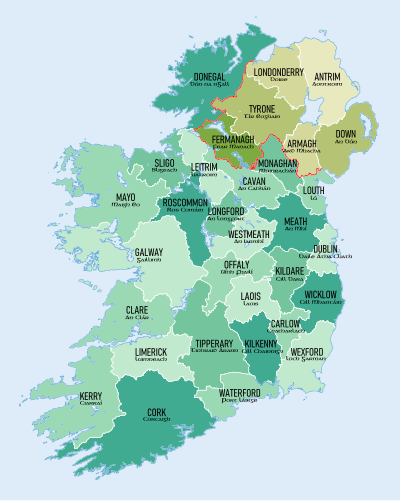Abbreviations and Key
| * | current monastic function |
|---|---|
| + | current non-monastic ecclesiastic function |
| ^ | current non-ecclesiastic function |
| = | remains incorporated into later structure |
| # | no identifiable trace of the monastic foundation remains |
| ~ | exact site of monastic foundation unknown |
| ø | possibly no such monastic foundation at location |
| ¤ | no such monastic foundation |
| ≈ | identification ambiguous or confused |
Locations with names in italics indicate probable duplication (misidentification with another location) or non-existent foundations (either erroneous reference or proposed foundation never implemented).
| NIEA | Scheduled Monument (NI) |
| NM | National Monument (ROI) |
| C.I. | Church of Ireland |
| R.C. | Roman Catholic Church |
| Foundation | Image | Communities & Provenance | Formal Name or Dedication & Alternative Names | OnLine References & Location |
|---|---|---|---|---|
| Annaduffe Abbey | early monastic site; founded 766, purportedly patronised by Comin Ea (possibly Cuimmin Fionn, Abbot of Iona); possibly ceased to exist 12th century; C.I. parochial church on site | Annaduff; Annagh-duffe; Annagh-yew; Eanach-Dubh | ||
| Cloone Monastery | early monastic site, founded 6th century (probably before 570), by St Cruimthir Fraech (in the time of St Colmcille) | Cluain-chollaing; Cluain-conmaicne; Clone | ||
| Cuivelleagh Friary ≈ | Franciscan Friars, Third Order Regular founded by Lord of Chanligh, confirmed by the "Bishop of Athenry" (probably Achonry) and the pope; probable mistaken reference to Creevelea (Dromahair), q.v. | |||
| Dromahair Friary |  | Observant Franciscan Friars founded 1508 by Margaret O'Brien (buried here), wife of Eoghan O'Rourke; burned 1536; rebuilt by Brian Ballach O'Rourke; dissolved c.1598; partly occupied by the English; occupied by a Harrison c.1617; another house built for friars 1618; reoccupied by friars 1642 and shortly after the Restoration to 1837 | Creevelea; Craobhliath; Crowlekale; Crueleach; Carrag Patrice; Petra Patricii; Druim-da-ethair; Baile-ui-ruairc; Ballegruaircy; Cuivelleagh ? | 54°13′52″N8°18′35″W / 54.231065°N 8.309692°W |
| Drumlease Monastery | early monastic site, founded 5th century by St Patrick | Druim-lias; Dromleas | 54°15′23″N8°17′47″W / 54.256401°N 8.296394°W | |
| Drumreilly Monastery | early monastic site; early bishopric; reference to hospital, 1479 | Druim-airbelaid; Druim-erbelaid | ||
| Fenagh Monastery | early monastic site; early bishopric; plundered and damaged 1244; possible community in existence up to 16th century | Fiodnacha-maighe-rein; Fidnacha | ||
| Jamestown Friary | Franciscan Friars convent founded 1641 or later | Baile-thaidh-duib; Tullagh; Jacobopolis | ||
| Killanummery Monastery | early monastic site; erenaghs in 14th century; with hospital 1595 | Cell-an-iomaire; Killynonyre | 54°12′29″N8°17′28″W / 54.208032°N 8.291245°W (?) | |
| Killarga Monastery | early monastic site; erenaghs until at least 1416 | Cell-ferta | 54°13′48″N8°12′27″W / 54.229963°N 8.207603°W (?) | |
| Killasnet Monastery | early monastic site, nuns founded by St Osnata | Cell-osnata | 54°19′43″N8°20′45″W / 54.328487°N 8.345704°W (approx?) | |
| Grange of Muintir Eolais [notes 1] | "Abbey", [notes 2] ruins of abbey, [notes 3] ruins of church [notes 4] | 53°58′40″N8°02′10″W / 53.977680°N 8.036188°W | ||
| Port Monastery [1] | Port; | 53°58′52″N8°03′58″W / 53.981052°N 8.066003°W (approx) | ||
| Lough Nahoo Monastery | early monastic site, purportedly founded by 500 | Lough-uama; Lough Uva | 54°14′17″N8°17′41″W / 54.238071°N 8.294849°W (approx) | |
| Monastery of Mohill-Manchan | early monastic site, founded 6th century by St Manchan; Attacked in 1590, parcel of monastery granted to Edward Barret 1592 [2] Mohill granted to Terence (Tirlaughe) O'Byrne 1594 [3] | St Mary Irish : Maethail, Maothail, Maethail-Manachain, Maothail-Manachain; Middle English : Maethla, Moithla, Moethla, Mucgail, Moghill, Mayhel; Latin : Mathail, Nouella | [4] 53°55′18″N7°51′52″W / 53.921641°N 7.864360°W | |
| Rosfriar | Franciscan Friars — from Donegal probable place of refuge | 54°14′01″N8°19′14″W / 54.233681°N 8.320427°W (approx) | ||
| Rosinver | early monastic site, purportedly founded either by St Maedoc or St Tighernach; coarbs recorded to 1438 | Ros-inbher | ||
| Rossclogher Abbey, Kinlough | early monastic site, nuns founded before 810 by Tigernach (St Tigenach), Abbot of Killeigh, for his mother, St Mella; possible "Abbey" site [notes 5] | Doire Melle; Doiremelle; Dairemeilli | 54°26′28″N8°14′25″W / 54.440989°N 8.240330°W |
